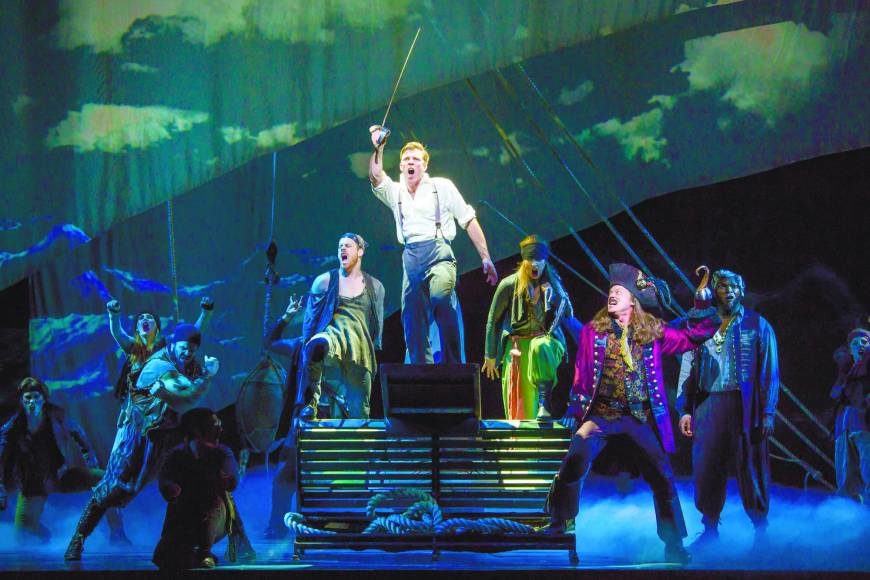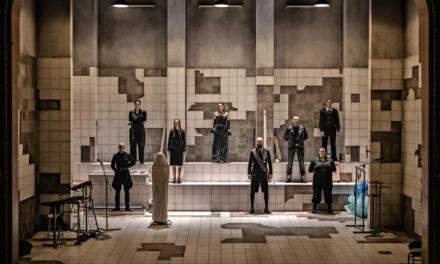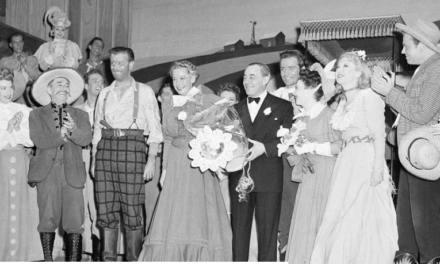“All the world is made of faith, and trust, and pixie dust.” In those few words the Scottish novelist and playwright James M. Barrie conjured from the mouth of Peter Pan, the mischievous young boy in his 1904 play of the same name, his own childlike outlook on life, whatever disappointments and betrayals it serves up.
Now, in the musical Finding Neverland, which is based on the Oscar-winning 2004 film of the same name, Tokyo audiences can get up-close and personal with Barrie (1860-1937) in this semi-biographical fantasy drama centered on the writer’s friendship with the Llewelyn Davies family — comprising parents Arthur and Sylvia and their five sons.
In particular, after Arthur’s death at 44, Barrie developed a close — but evidently entirely platonic — relationship with his widow, and with her sons, the fourth of whom was named Peter. In fact, although he was married himself, the writer sometimes even supported them financially.
It was out of his daily experience with the family that the writer was inspired to write his iconic Peter Pan masterpieces, including The Little White Bird, Peter Pan and Peter and Wendy. Both the books and the plays in that now world-famous series are mainly set on the fantasy island of Neverland, where a group of orphan children happily share all kinds of adventures together with pirates, mermaids and a boy fairy named Peter Pan.
However, everything didn’t go quite as swimmingly for the musical Finding Neverland, which is based on a book by James Graham, with music and lyrics co-written by songwriter and producer Eliot Kennedy and Gary Barlow, lead vocalist of the British pop act, Take That.
In fact, following its 2012 world premiere in Leicester, England, prior to an anticipated transfer to London’s West End, it was instead extensively reworked in New York. Then, after reopening at the American Repertory Theater in Cambridge, Mass., directed by Diane Paulus, a 2013 Tony winner for her revival of Pippin, it went on to have a hit 17-month run on Broadway.
The show (with subtitles) comes to Theatre Orb in Tokyo’s Shibuya Ward from Sept. 8 to 28. Ahead of that short run, Billy Harrigan Tighe took time off from his role as the show’s hero, J.M. Barrie, for a flying visit to Tokyo to talk about the musical, which, he said, doesn’t just tell the moving yet little-known story of how Peter Pan came to be created but also has a deeper message about how people can live together in peace.
“The musical shows us the importance of humans’ ties and each person’s relationships with others,” he says. “In our everyday lives, we have a mutual influence with families, friends, and neighbors, as well as close people we’ve already lost and others we’ll encounter in the future.
“So this musical reminds us that anyone could be special for someone, and also that it’s people who make a person’s life — and I believe that’s a strong universal message that appeals to all ages, genders, and nationalities.”
In fact, Tighe — appearing here in his first leading role in a touring musical — says he has been hugely influenced “through spacetime” by the author whose role he plays.
“At the beginning of the show, although Barrie is a very successful playwright, he is going through a kind of slump. So this story is about how he followed his instinct and started to create what he really wanted, regardless of making money or adding to his reputation,” he explains.
“In my case, though I’ve been lucky enough to be in major works such as Wicked and The Book of Mormon on Broadway and in the West End, through playing J.M. Barrie this time I’ve rediscovered why I wanted to be a stage actor in the first place.
“That’s because I realized how, to some extent, I’d fallen into the common trap of chasing fame and success, and I’d nearly forgotten my initial motivation.”
Tighe, who became fascinated with singing after joining a church choir as a child growing up in a town outside Atlanta, says theater helped him to build up his confidence, as the process of portraying various characters and questing for their true natures unexpectedly led him to discover himself more deeply.
In addition, he says Paulus gave him the idea of the difference between “performing” and “finding reality” when he worked with her for the first time on Pippin.
“Diane always required the actors to live the characters, not represent them from general perception,” he says. “She let us find in ourselves the real character whose role we were playing, and that’s not the general image of a director. So until I found it, she just waited for that moment patiently without saying anything. She is a tough director.”
Tighe has also praised Paulus’ use of clever visual effects to tell a story — and he believes that’s a big reason for this musical’s universal appeal.
Those visual effects, though, are neither the product of high-tech digital wizardry or gorgeous large-scale sets. Instead, Paulus prefers the rather more low-tech and simple that leave lots to the audience’s imagination.
So in the show’s last scene, in which the widow Sylvia (Christine Dwyer) is overcome with happy feelings, shreds of glitter vortex up like a tornado, instantly creating quite a magical moment.
Similarly, while many big shows now feature spectacular effects created with computer graphics, zip-lines, projections, and pulleys, it’s people power that makes children fly through the air in Finding Neverland, as unlit performers almost invisibly hold them high above their heads and move their bodies smoothly around as if they were as free as birds rather than dangling from wires.
Ironically, people were wowed when actors “flew” from two ropes across a London stage in Peter Pan in 1904, while now, more than 100 years later, they’re being wowed anew by the man-powered but physically beautiful flying scenes in Finding Neverland.
However, as Barrie says in one of the many famous quotes from Peter Pan: “The moment you doubt whether you can fly, you cease forever to be able to do it.” In fact, Paulus commented on this recently, saying, “I absolutely related to that quest to create something beyond the boundaries of what we believe as possible. I related to the struggle of who you have to convince and how you have to rally the troops in the struggle to see your ideas become reality.”
As both Barrie and Paulus have observed, we are able to see Peter Pan fly if we use our imagination — and theater is a place to stimulate that precious sense and set it free.
This post originally appeared in The Japan Times on September 5th 2017. It has been reposted with permission.
This post was written by the author in their personal capacity.The opinions expressed in this article are the author’s own and do not reflect the view of The Theatre Times, their staff or collaborators.
This post was written by Nobuko Tanaka.
The views expressed here belong to the author and do not necessarily reflect our views and opinions.


















